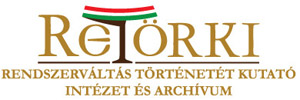Riba András László - Szekér Nóra: Dokumentumok a Magyar Demokrata Fórum korai történetéből, 1987-1989. Válogatás a lakiteleki Rendszerváltó Archívumból - RETÖRKI könyvek 27. (Lakitelek, 2017)
Dokumentumok
Dokumentumok The Hungarian Democratic Forum was formed in the autumn of 1987. At its meetings intellectuals and members of other social groups discuss specific, current problems concerning Hungary and Hungarian society, giving expression to their independent, personal opinions. Following the exchange of views, the participants usually agree on a collective standpoint and draw up a set of recommendations. These are then presented to the relevant Hungarian institutions and to the general public. On the 6th of March, 1988, the Forum met to discuss, for the first time in its history, an issue of foreign policy, but one that affects the Hungarian nation closely and directly, viz. the deteriorating situation of ethnic Hungarians who live in the neighbouring state of Rumania. This was also the first time that the Forum decided to address the international community, too, and to request its support for the Hungarians and other minority groups in Rumania. Dramatic developments have prompted the Hungarian Democratic Forum to take this step. The policies pursued by Rumania flagrantly disregard the human and civil rights of all the citizens, but they have created an especially grave situation for the ethnic and religious minorities within the country. In addition to the deprivations affecting everyone the discriminatory and forcefully assimilationist policy of an exceedingly nationalistic government is particularly harmful to the minorities. Rumania is carrying out a policy of cultural genocide, and since the beginning of the 1980’s its methods have become more open and increasingly evident. This policy is directed primarily at the more than two million individuals comprising the Hungarian minority. A large European community, which is known to have lived in its homeland for more than a thousand years, is now facing the untenable alternative of unwilling emigration bordering upon expulsion or forced assimilation. Due both to its size and its strong national consciousness the members of this community are neither able nor willing to do either. Instead, they wish to remain in their native land as Hungarians and to exercise their individual and collective rights, in full equality with other individuals and communities. The forceful deprivation of the language, culture, and historical traditions of an entire people is a violation of basic human rights. In the case of the Hungarian minority in Rumania the sensitivity and concern of Hungary is understandably great, since, in a historical and cultural sense, Hungarians 67
